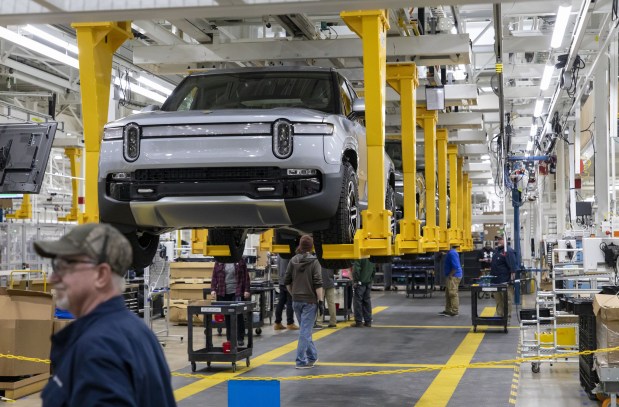Facing an industrywide slowdown in demand for electric vehicles, Rivian is laying off 10% of its salaried workforce, including a small number of employees at its downstate Normal assembly plant.
California-based Rivian has more than 8,000 workers in Normal, including about 7,000 hourly assembly workers who will not be affected by the layoffs, the company said. The startup EV manufacturer has about 16,700 employees overall.
“Team changes are the hardest decisions I have to make as CEO,” Rivian CEO and founder R.J. Scaringe said in an email to employees Wednesday. “Our business is facing a challenging macroeconomic environment—including historically high interest rates and geopolitical uncertainty—and we need to make purposeful changes now to ensure our promising future.”
Employees receiving pink slips will be notified Thursday morning, Scaringe said in the email.
Scaringe also discussed the layoffs during a fourth quarter earnings call Wednesday afternoon, putting the staff reduction in the broader context of streamlining operations as Rivian continues to refine production in Normal, and prepares to launch a new EV line at a second plant to be built in Georgia.
Rivian began production in September 2021 and builds its electric R1T pickup truck, R1S SUV and commercial delivery vans for Amazon and AT&T in a renovated 3.3 million-square-foot auto plant about 130 miles south of Chicago.
Last year, Rivian produced 57,232 vehicles. Its target for this year remains 57,000 vehicles as it navigates high interest rates, flattening demand for EVs and a planned three-week shutdown of the Normal plant in April to retool the assembly line for greater efficiencies.
Scaringe said the shutdown will accommodate a number of supplier and component changes that will reduce material costs. It will also improve the speed of production, he said.
“With that multi-week shutdown, we are making improvements…focused on line rate and the ability to run the line at a higher speed and therefore in a more efficient manner,” Scaringe said.
Improved efficiencies, Scaringe said, will position Rivian to achieve a “modest gross profit” in the fourth quarter of 2024.
Rivian generated $1.3 billion in revenue and lost more than $1.5 billion in the fourth quarter of 2023.
The company had $7.86 billion in cash as of Dec. 31.
R1T trucks on the assembly line at the Rivian electric vehicle plant in Normal on April 11, 2022. (Brian Cassella/Chicago Tribune)
EV market share is expected to reach 8% of total new vehicle sales in 2024, up from 6.9% last year, according to the car shopping website Edmunds. EVs topped the 1 million sales mark in the U.S. last year for the first time.
But there are signs, despite federal, state and manufacturer incentives, that the EV transition has decelerated after an initial rush of early adopters.
In addition to lowering production costs, Rivian will be looking to find new buyers for its pricey but well-received R1 EVs, which start at about $70,000.
“Our key focus is on increasing demand to achieve our 2024 delivery targets,” Scaringe said.
Despite economic headwinds, Scaringe said Rivian is moving ahead with the launch of its downsized and more affordable R2 crossover EV, which will be unveiled March 7.
Scaringe said Wednesday the R2 will fill the need for a “highly compelling EV” in the $45,000 to $55,000 price range and help get the 93% of the market that’s not buying an EV excited about leaving their combustion engine vehicles behind.
The R2 is expected to begin rolling off the production line in 2026 at Rivian’s planned $5 billion Georgia plant, which is set to break ground this year.
rchannick@chicagotribune.com



